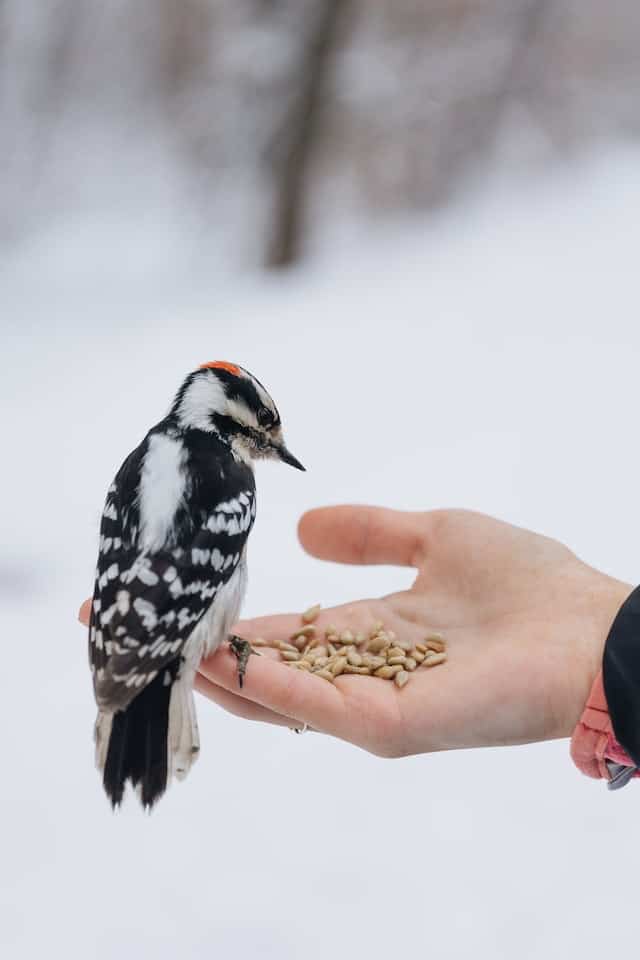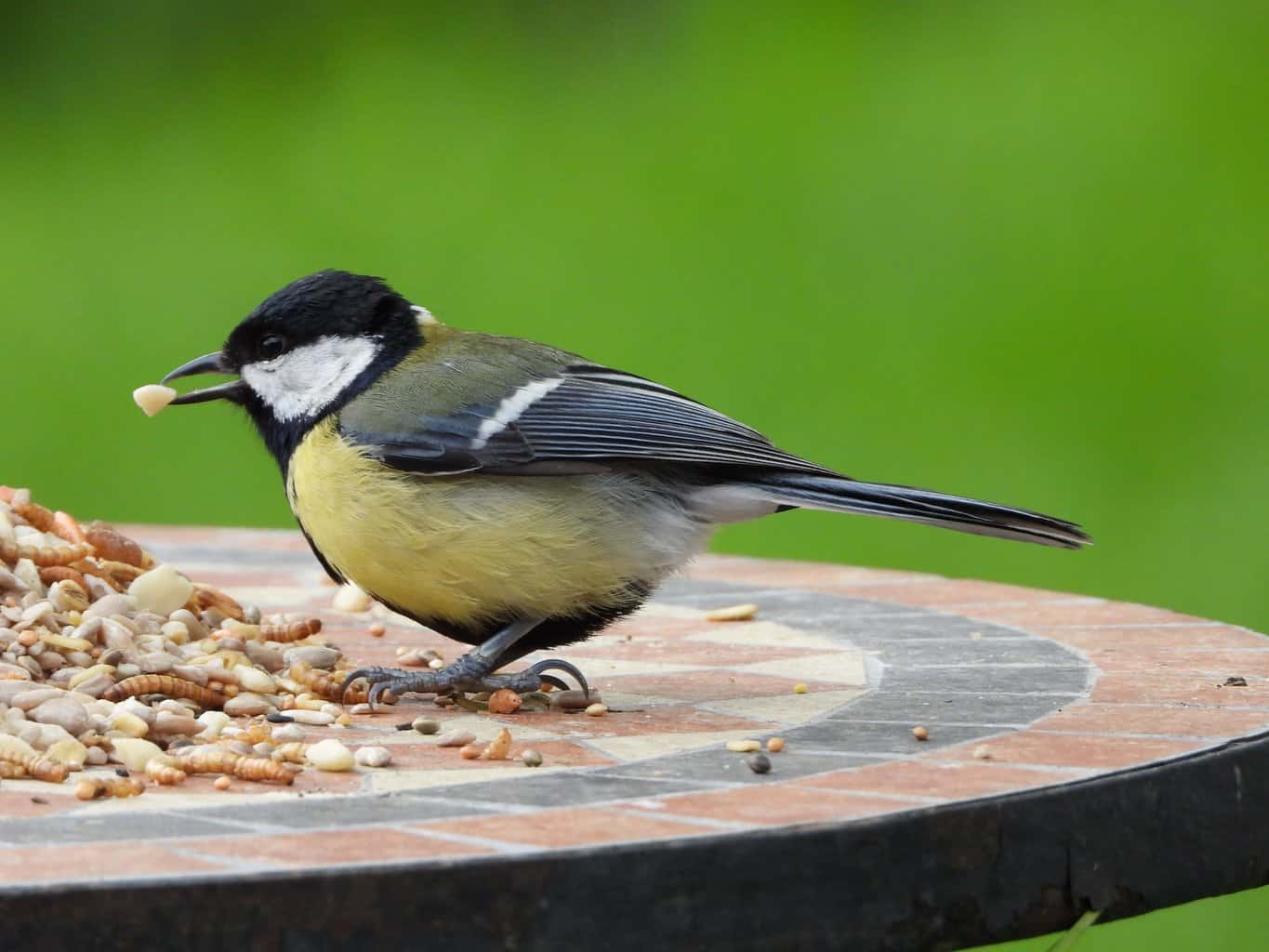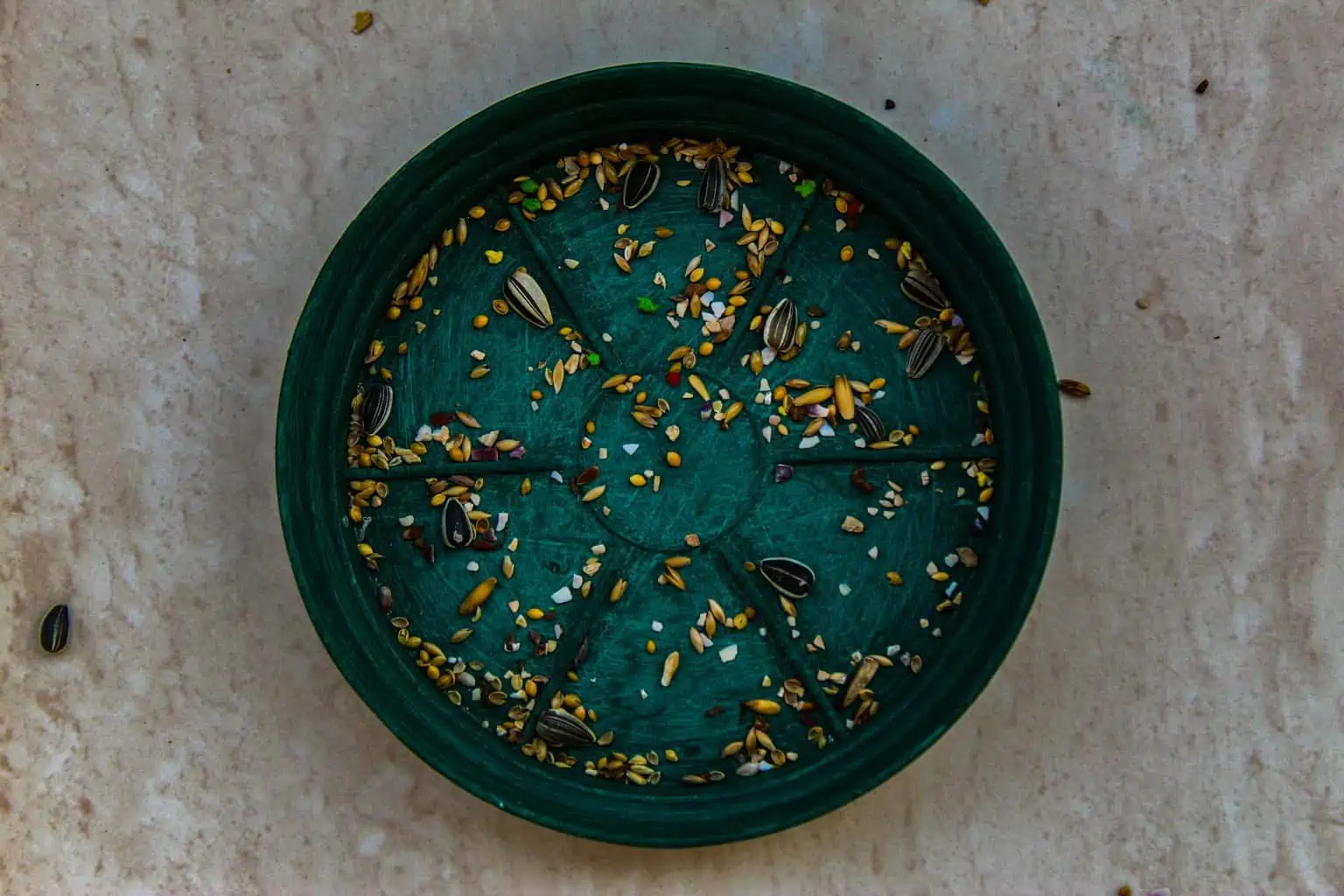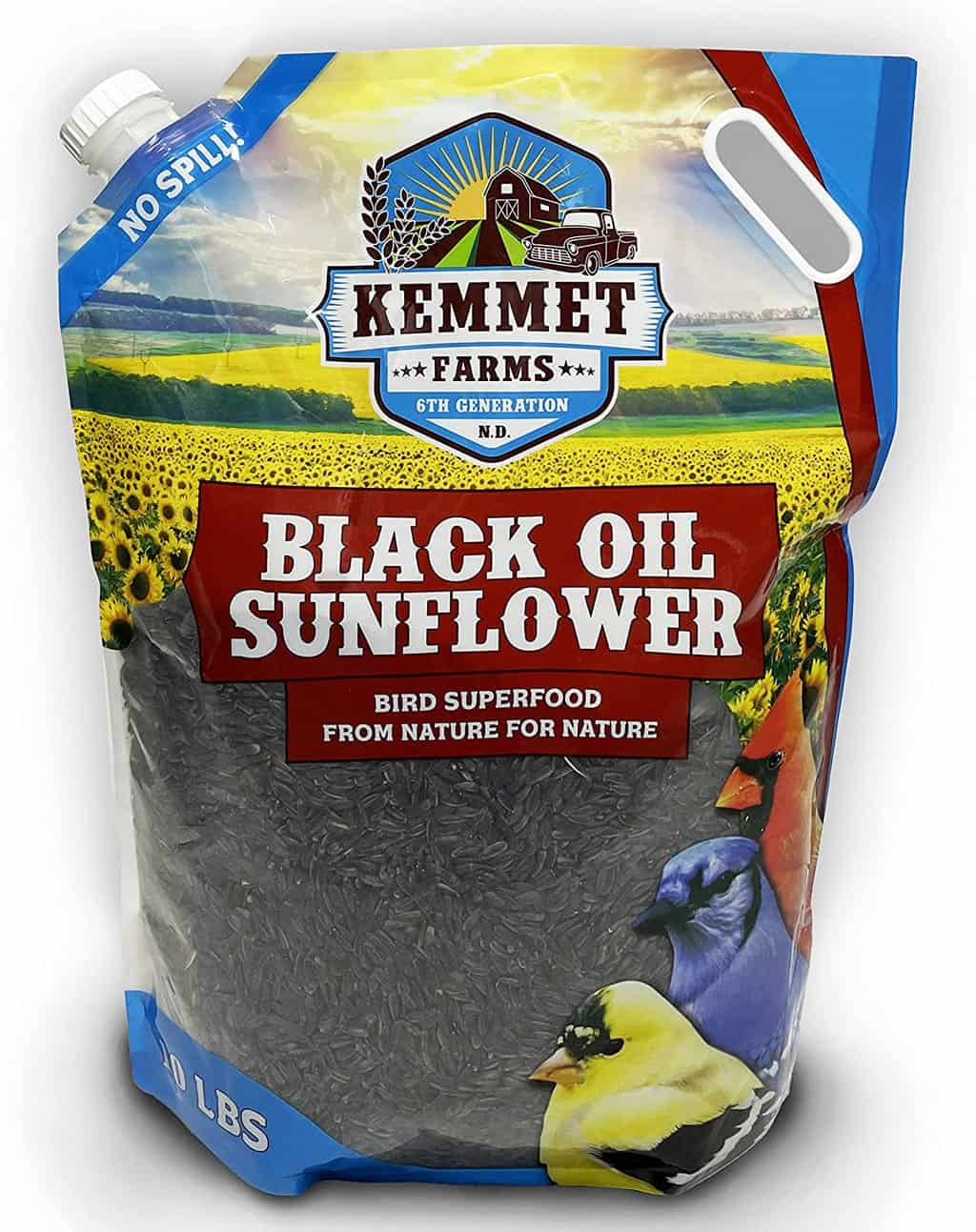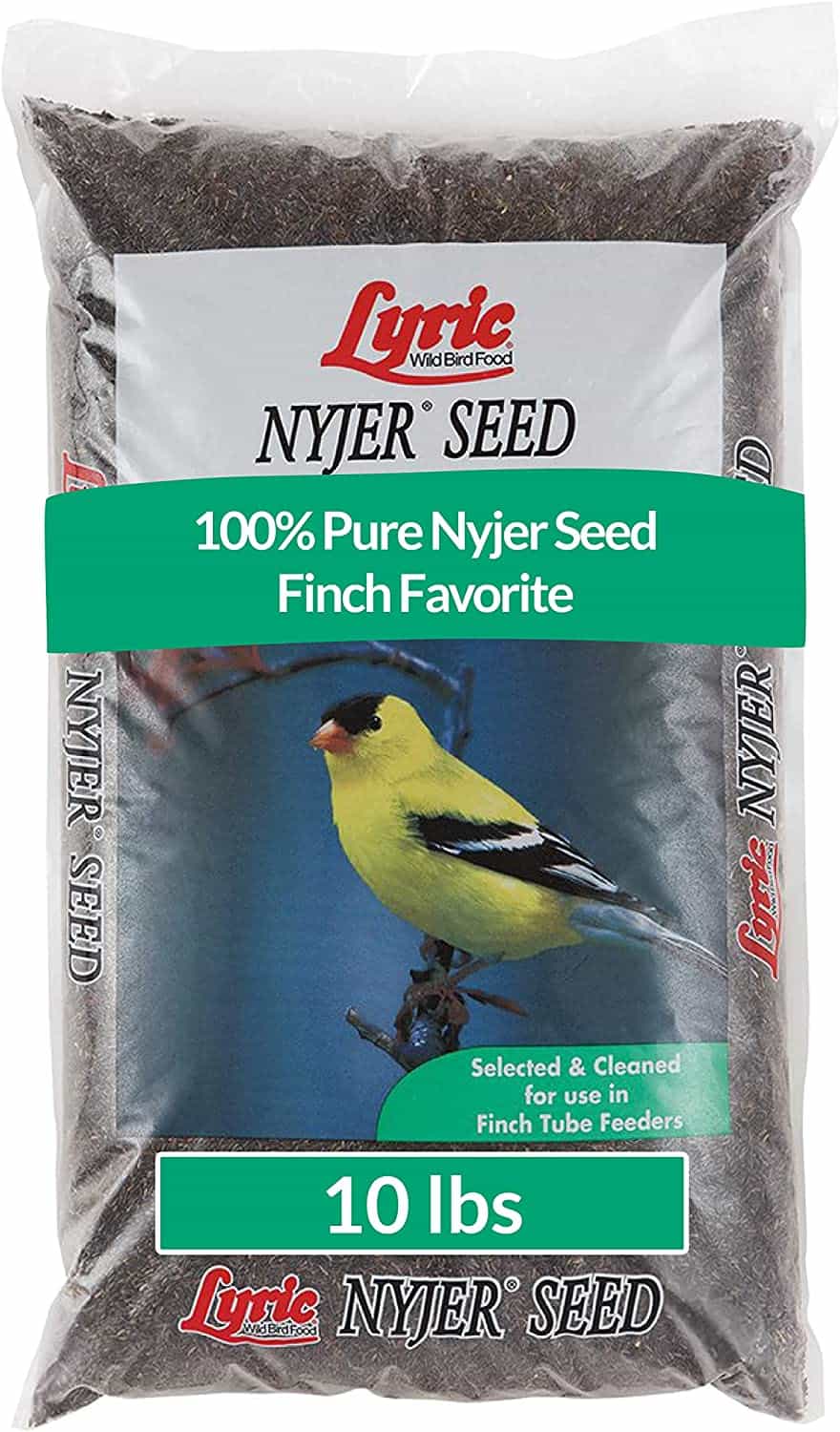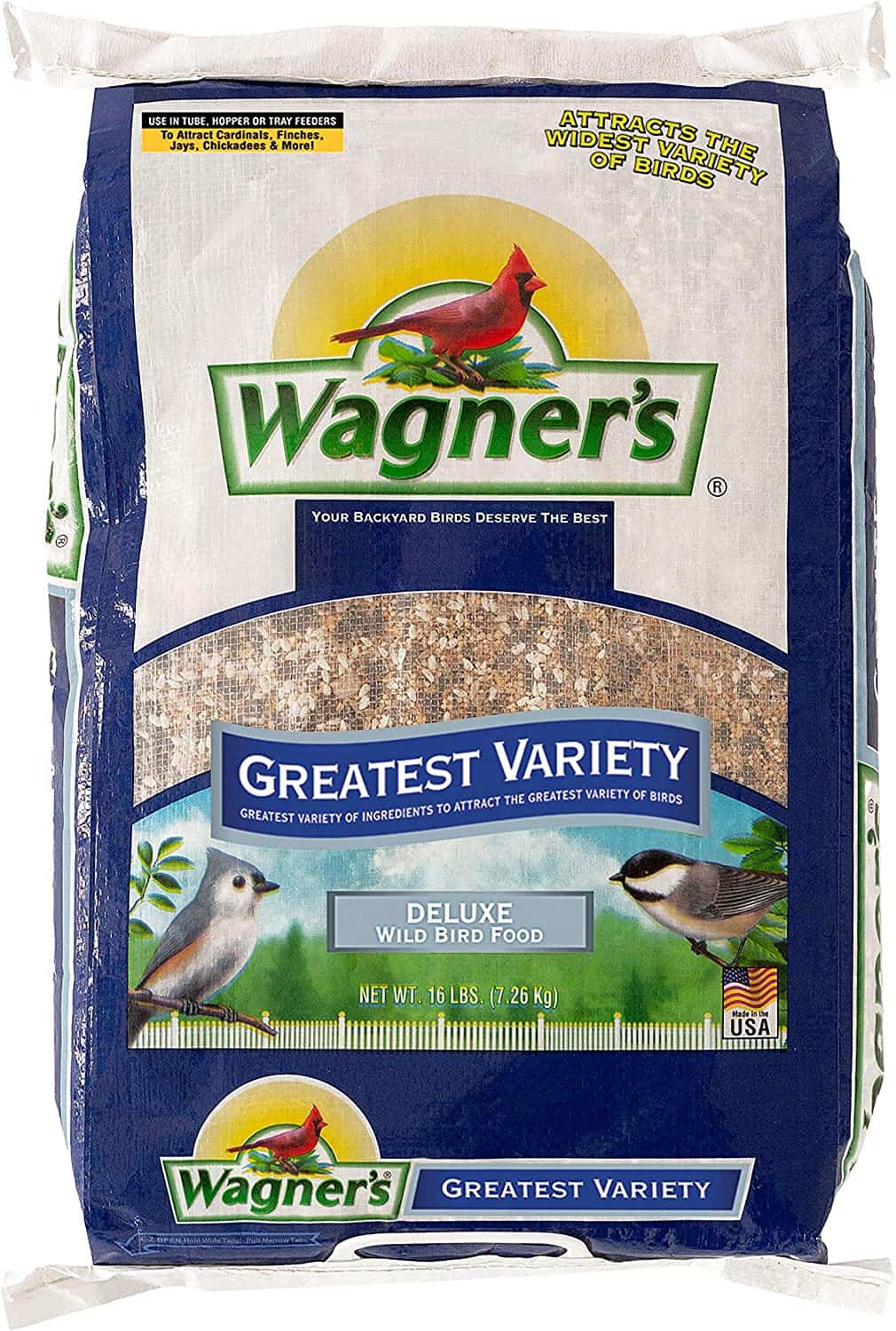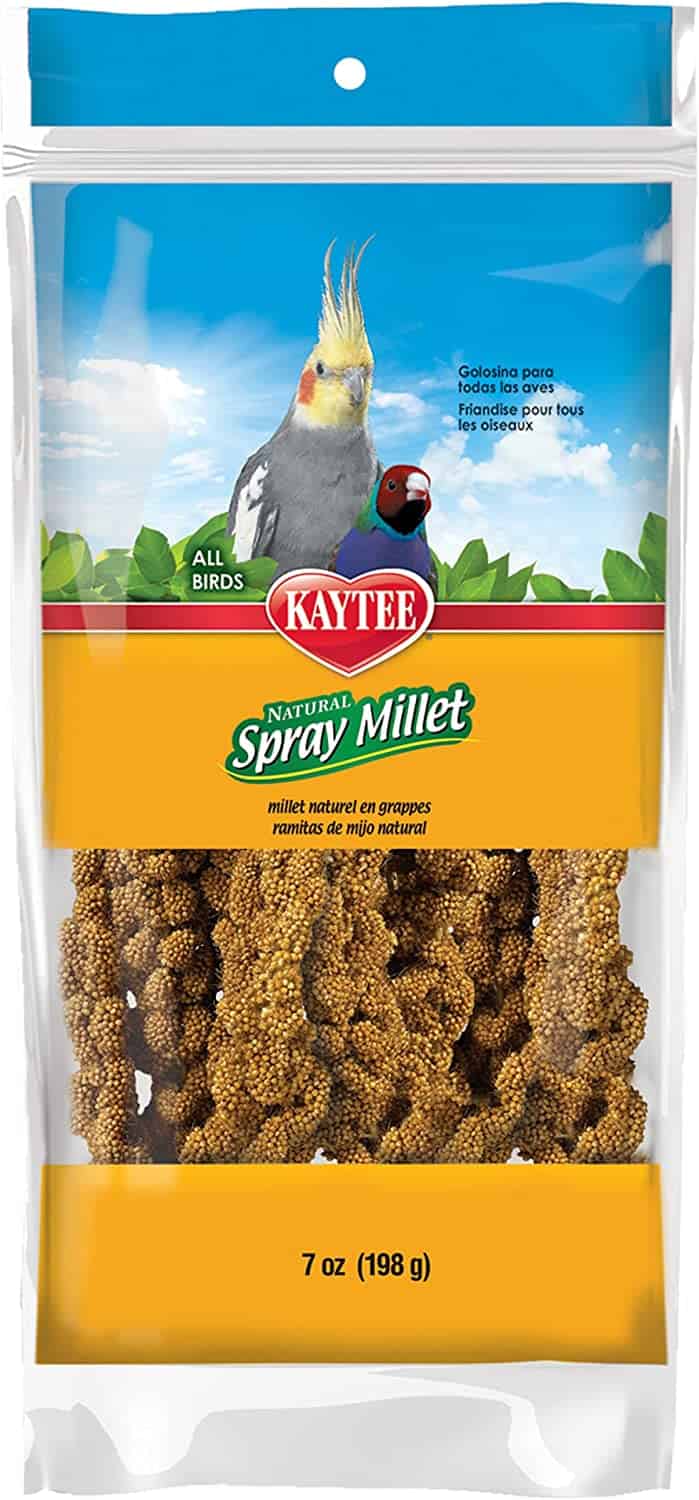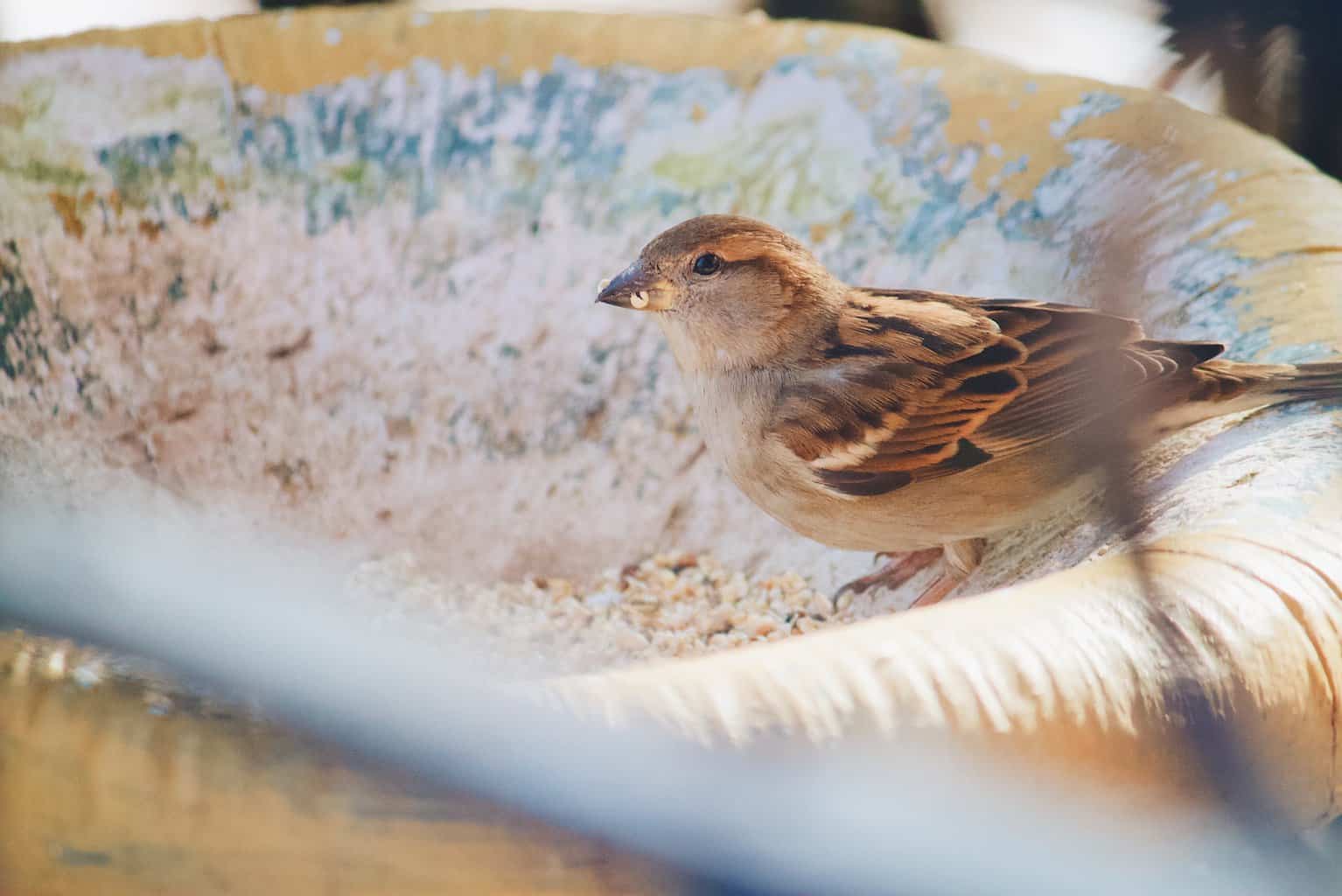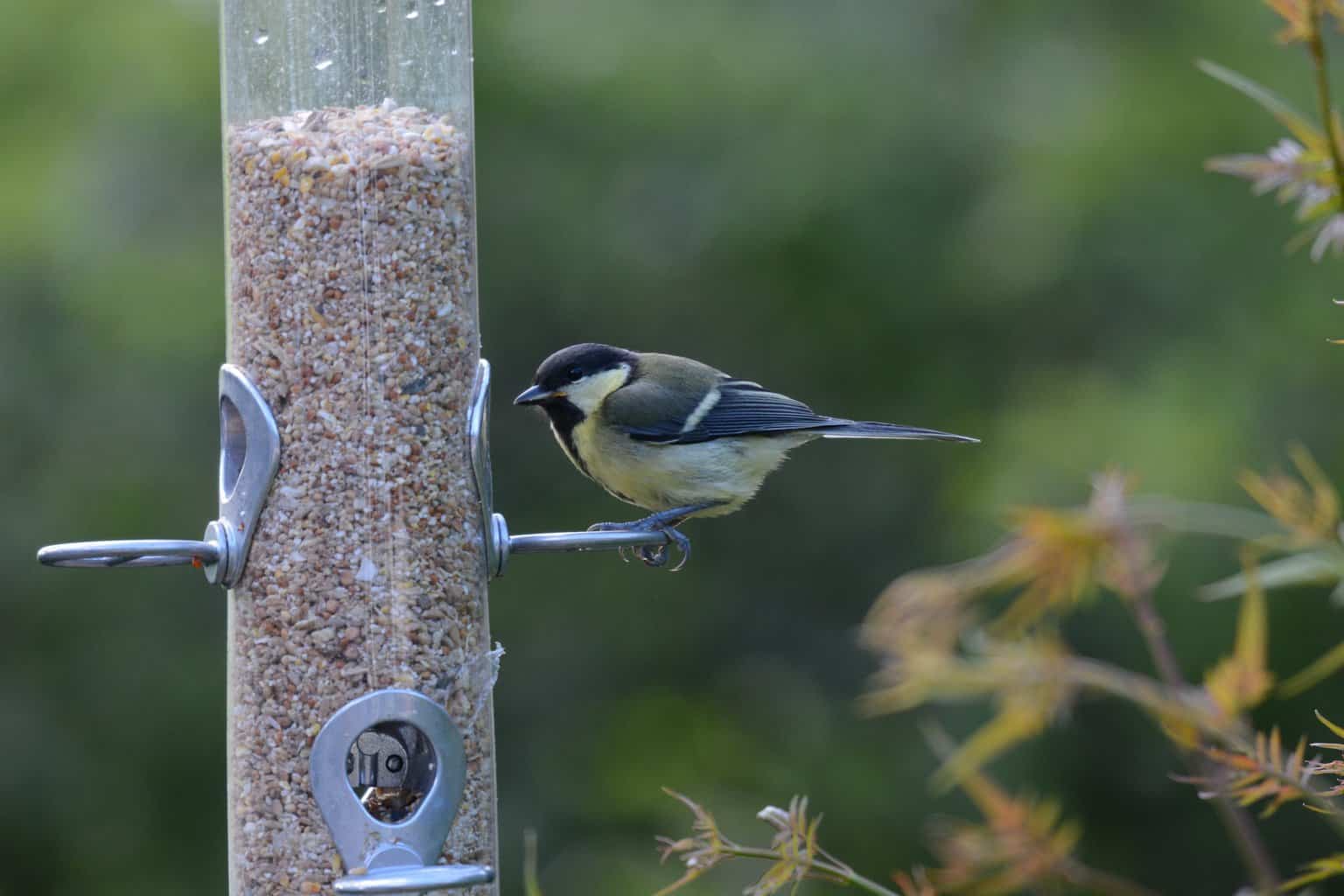- 25 Best Gourd Birdhouse Ideas to Attract and Thrill Your Feathered Friends - December 3, 2022
- Red-cockaded Woodpecker: Shaky Conservation Success Story - November 15, 2022
- Common and Migratory Woodpeckers in Michigan Guide: Where to Spot and How to Attract Them to Your Backyard - November 1, 2022
Imagine this: It’s a lovely spring day. A gentle breeze blows through your courtyard. Three American Goldfinches swoop down as you sit at your porch table to enjoy a hot cup of cappuccino. They land on Japanese Maple a few yards away from you.
Everything seems serene.
You feel you’ve finally made it to paradise.
A few months ago, your life was not so elegant. You did not have many beautiful wild birds grace your garden. But you’ve rolled up your sleeves, created a fantastic bird utopia, and even bought the best wild bird seeds. And now birds visit your backyard in droves.
If the above seems like a scene from sci-fi movies,
It can be a reality.
I know the feeling of having a colorful flock of birds visits your yard. The birds will always visit your yard if they know they will have delicious seeds to eat.
In this post, I’ll show you the best seeds for birds and the best value for your money. And how to attract them.
The Bottom Line Up Front
Birds are very picky eaters. If you serve them the food they prefer, they’ll spend more time in your yard. And they will even bring some friends along.
The ideal way to attract birds is to provide them with the best wild bird seeds. And when buying seeds, always consider price, freshness, quality, ingredients, packaging, and bird species. Watch out for fillers like milo and Millet.
Black sunflower oil seeds are the best. They are relatively small, high in fat, highly nutritious, and light shell, and most birds like them. Though they don’t come cheaply, they attract the most birds and save the stress of mess under the bird feeders.
Pick high-quality seed mixes that appeal to the widest variety of birds. And avoid the highly cheap seeds. In most cases, they are full of fillers, have no nutritional value for the bird, and maybe even poisonous to the birds.
Here are my top bird wild seed mixes.
- Best wild bird seed premium sunflower KEMMET FARMS, Black Oil Sunflower Seeds
- Best nyjer wild bird seed – Lyric Nyjer Seed Wild Bird Seed
- Best variety wild bird seed – Wagner’s Greatest Variety Blend
- Best low-cost wild bird seed – Kaytee spray millet
But first, let’s see the importance of feeding wild birds.
Importance of Feeding the Birds
Bird feeding is an excellent way to connect with nature. Time spent observing them is priceless and comes with enormous benefits. Below are some of them.
Birds help to remove insects and bugs from your home at no Extra Cost
The seeds and sugar water you provide to hummers are only the first courses for your birdies. They’ll catch other tasty treats in your backyards, such as insects, bugs, snails, and spiders.
Birds are a biological pest control method. Birds are great at keeping down populations of pests such as mosquitoes, beetles, flies, and dragonflies.
It Helps Keep Mother Birds Close to Their Chicks
The more food your birds find during breeding, the less they’ll leave their chicks unattended while hunting for food.
With consistent nutrition, you can help them meet their caloric needs. You’ll keep them stress-free and connected to their babies. You save the chicks from the heartache of losing their parents if a predator feasts on them when foraging for food. What a kind gesture! You increase the chances of the chicks growing up under their parents’ care, enhancing their survival.
It Helps the Birds to Survive During Winter
Winter is a rough time for birds. Their food supply decreases, and they must survive in cold conditions, especially at night. The migratory birds also need food to provide them with energy en route.
That’s where the bird feeder comes in. It helps to mitigate food shortages. It also provides fueling points for migrating birds.
Bird Feeders Motivate You to Spend a Considerable Time Outside.
A recent study found that at least two hours per week in nature is linked to excellent health and well-being. Being in nature is beneficial because it:
- Enhances your memory
- It boosts your self-esteem and happiness.
- It helps you absorb vitamin ideal for developing and maintaining healthy bones.
A yard full of birds can help you bond with your kids and grandkids
It’s challenging to bond with the youths nowadays. They are always glued to phones, catching up with the latest gossip on social media. But if you have a feeder on your patio, it could help distract them from the gadgets.
You could show them the different birds flocking the feeder. Or even play games to identify and name birds. This will foster their interest in nature while they are still young.
Factors to Consider When Buying Wild Bird Seed
First, remember that no one type of seed is best for every situation.
Bird seeds can be pricey. And, if you’re new to birding, it may be hard to know what kind of bird seeds are best for your birds.
But before you go shopping, consider these things first:
Freshness
Buy wild bird seed packaged in triple-barrier bags to seal in freshness. It prevents any leakage and insects from spoiling the product.
Also, it ensures the seed you put out is in a premier state. Like you, birds prefer fresh food, so you’ll have more colorful visitors than ever!
Quantity
The amount of bird seeds you buy depends on how many birds you need to feed. The more seed you buy, the more you spend.
Regardless of the number of birds you feed, ensure each bird gets enough. Put yourself in the birds’ shoes. Leaving your comfort zone to attend a party and return home on an empty belly would be frustrating.
Buy seeds in bulk to save time and a couple of dollars in the long run.
Price
How many dollars are you willing to spend on bird seeds? Less is more in most cases. Some brands are pricier than others because they offer top-quality seeds.
In buying seeds for your feathered friends, the options will tempt you. But before you do anything else, ensure you’re not being ripped off. Cheaper products can look like a good deal at first glance, but it’s probably not worth it if your birds don’t like them.
Ingredients
Like humans, birds also need high-quality food. They require food with the proper nutrients to sustain their high energy needs. A good diet also ensures the splendid development of young and healthy birds.
Wild bird seed mixes come with different ingredients. So if you want to attract certain types of birds, you’ll want to consider what they like. To ensure the seed mixes have the right ingredients, read the labels. You can also check reviews online and see if anyone has had an issue with the quality of their product.
Quality bird feed should include:
- Grains and seeds: seeds and grains are the base of bird feed. Giving the birds a mishmash of seeds and grains ensures they receive a nutritious diet meeting their needs.
- Berries: berries are an excellent addition to bird food mixes. They are a good source of vitamins, calcium, iron, and zinc.
- Insects: Insects are a great way to supplement a bird’s diet. They provide a natural protein, which is essential for birds’ health. Insects also provide energy for wild birds, so they can fly long distances without tiring out.
- Protein: Sunflowers and suet are excellent sources of protein for birds.
Know what You’re Looking for
There are many seed mixes on the market—each designed to attract a particular type of bird. If you have cardinals in your area, sunflower seeds are great. Goldfinches need safflower seeds.
Some bird feed brands conceal substandard bird feed in their mixes. Be alert when shopping for quality bird food. Keep an eye out for crushed dog biscuits and seared peas, as they’re ‘fillers.’ Most birds won’t eat them as they have little nutritional value and might grow in your garden.
Consider your geography
Birds will gravitate toward certain types of food based on their natural environment. The East Coast has more pine trees, attracting black-capped chickadees. The West Coast has more oak trees, so it attracts acorn woodpeckers.
Think about where you live and buy bird feed suitable for nearby birds. Sparrows, titmice, wrens, juncos, warblers, robins, and finches are common backyard birds. Try putting out peanuts if you’re having trouble getting these guys to visit your feeder. Rotate the bird seed with unique blends to ensure each feathered friend gets something.
Packaging
The material used to wrap the seeds is crucial as it ensures the birds’ feed stays fresh for longer. Remember that birds are like you. They prefer their food fresh for the superior nutrition and excellent taste.
Go for seeds packaged in triple-barrier bags. These bags keep the bird food fresh for a long time. Such bags prevent leakage and stop annoying insects from spoiling your product.
Seed Cleanliness
Clean bird seed is the only kind you should be buying.
Bird seed can come in different cleanliness grades—the higher the grade, the cleaner the seed. So don’t buy contaminated seeds with sticks, trash, debris, and dirt!
Buying seeds full of contaminants will require you to run them through gravity tables, aspirators, and sizing screens.
You may not have these items on your premises. It will also take a considerable time to clean them to ensure you serve your feathered friends clean food.
Bird species
The best wild bird feed depends on what birds you want to attract and what region you live in. For example, sunflower seeds are a favorite among backyard birds in warmer climates. They contain high amounts of fat, which helps them stay warm. In colder climates, nyjer seed (thistle) is preferred because of its higher protein levels. Consider your environment and the birds in your locality to help you choose the best wild bird seed.
A mix of seeds may be appropriate if you live in a place with short winters.
Best Wild Bird Seed Reviews
I have been feeding wild birds for decades. And I know by heart what foods different birds prefer. I also understand how it feels like to have no wild birds in your courtyard despite spending vast sums of money on feeders and bird seeds. To create the list, I considered
- Packaging
- Freshness
- Quantity
- quality,
- Price.
Here are my top picks.
KEMMET FARMS, Black Oil Sunflower Seeds
KEMMET FARMS strives to provide you with the best bird food possible. That’s why they offer premium black oil sunflower seeds grown in the USA with high energy, essential oils, and nutrients.
It features a screwable cap for proper storage and a super easy pour to prevent spills.
Wild birds (and other animals) are naturally drawn to this premium food. Because it contains 28% fat, 25% fiber, and 15% protein. Plus, it is naturally rich in calcium, potassium, iron, and vitamins A & B and E.
Pros
- The screwable package prevents spillage while keeping seeds fresh for a long time.
- It is suitable for various birds, from tiny to large.
- Suitable for various feeders, including platform, hopper, and tube feeder.
Cons
- It is pricier than most bird seeds.
- It is a magnet for squirrels.
Lyric Nyjer Seed Wild Bird Seed
Experts have designed lyric Wild Bird Seed to meet the nutritional needs of small beaked birds. As finches are frequent backyard visitors, you will have them in droves with it.
With these specifically formulated wild seeds, you will attract all finches, including American goldfinches, house finches, purple finches, and pine siskins.
It is popular among birders because it provides birds with energy during chilly seasons. It contains at least 25% fat and 15% protein, which is crucial for bird growth and survival in the winter months.
Pros
- Attracts a wide variety of finches, redpolls, and siskins.
- They are packed with fiber, protein, and fat for wild birds.
- It has no fillers, dust, or stem.
Cons
- Not suitable for large feeders.
- It quickly gets stale during rain and snow periods if not well protected.
Wagner’s Greatest Variety Blend
Wild birds flock to your yard if you offer them the food they like. You can attract different gorgeous wild birds if you provide them with this product.
This blend is a favorite as it has various ingredients that appeal to most birds.
It contains
- canary seeds,
- cracked corn,
- Nyjer
- peanut kernels
- red milo
- red Millet
- striped sunflower seeds
- white Millet
- safflower seeds
- sunflower chips.
It attracts
- Nuthatches
- Cardinals
- Woodpeckers
- Finches
- Chickadees
Pros
- Most birds can’t resist it because it contains the most appealing ingredients for them
- It has no red milo, which birds don’t eat unless starving, and cold
- You will get value for your investment as it is affordable and of superior quality
Cons
- The bag is not resealable
- The bag is not waterproof
Kaytee spray millet
Kaytee Spray Millet is a natural source of nutrition that can help birds get the proper nutrition in their diet. It’s also great for fledglings, juveniles, and full-grown birds.
You can also use spray Millet as a bonding tool with your bird—it’s fun to see how they react when they try to eat it!
Kaytee Spray Millet is a great way to add extra nutrients to your bird’s diet. The spray comprises a highly nutritious Millet packed with protein and fiber. It is pretty low in fat and high in calcium, iron, and vitamins.
Pros
- Spray Millet is ideal for playtime and bonding with your bird, too.
- It has no artificial flavor or colors.
Quality Seeds that Attract Most Birds
It is critical to research before feeding your backyard birds. Some of them are picky eaters. You do not have to blow your hard-earned cash on bird food only for them to ignore it.
Pay attention to the brand ingredients. It’ll help you ensure it contains top-quality seeds to avoid wastage. Confirm the bag is clean and the seeds are fresh. You may part with more money but get the best of both worlds.
You’ll attract more beautiful birds and get less waste. You will have a superb experience when birdwatching in your courtyard. Here are the quality seeds attractive to most birds.
Black Oil Sunflower: it is a common ingredient in very many mixes. Most birds like it, but it is pricey.
Hulled/Chipped Sunflower is a Black Oil sunflower minus the casing or shell. Goldfinches, titmice, and chickadees love it so much.
Nyjer has been grown in India and Ethiopia for thousands of years, and it’s the only type of bird seed that most songbirds will eat.
Peanuts: A tasty treat for woodpeckers, titmice, chickadees, and nuthatches.
Millet and corn are excellent for ground feeders such as doves, juncos, and ducks.
Safflower: It’s super attractive to cardinals, sparrows, grackles, and starlings.
Striped Sunflower is the favorite seed for Blue Jays and red-bellied woodpeckers.
A simplified table shows different bird species and the feed they like most.
X- favorite
Will also eat
| Species | sunflower | safflower | Corn | millet | Milo | Mixed seed | Nyjer | Suet | Peanut butter |
| Jays | √ | √ | √ | ||||||
| Woodpeckers | √ | √ | √ | √ | |||||
| Orioles
Tanagers |
√ | ||||||||
| Indigo buntings | √ | √ | √ | ||||||
| Pigeons | √ | √ | √ | ||||||
| doves | √ | √ | √ | ||||||
| Pine Warbler | √ | √ | |||||||
| Tufted Titmouse | √ | √ | |||||||
| Dark-eyed Junco | √ | ||||||||
| Chickadees,
Titmice, Nuthatches |
√ | √ | √ | ||||||
| European sterling | x | ||||||||
| Finches | √ | √ | √ | √ | |||||
| Grosbeaks | √ | ||||||||
| Sparrows
Blackbirds |
√ | √ |
Feeding Wild Birds Basics
Over a hundred bird species in North America eat seed, suet, fruit, and sugar water to augment their diets. When feeding birds, take precautions to ensure that you do not hurt the birds. If you’re not careful, evidence shows you could promote bird feeding problems such as
- Window collisions
- Predation
- Spread of diseases
- Help invasive species outdo native birds
All is not lost, though. You can feed the birds without “harming” them unintentionally.
Here’s how.
Keep Your Feeder clean all the time
To reduce the risk of disease, clean your bird feeder twice a month with a soft cloth and mild dishwashing soap. If you have a recent model, you can disassemble it for thorough cleaning in the dishwasher. Also, run the feeder through a weak bleach solution to kill bacteria.
The solution should be one part bleach and ten parts hot water. Soak them in the solution for a few minutes. After disinfecting them, rinse them with water and let them air dry completely.
Note that you should clean a hummingbird feeder twice a week to stop mold from growing, as it can kill the birds.
Observe the Birdies at Your Feeder
Sweep moldy and discarded seeds beneath the feeders. It will prevent diseases and deter clumsy raccoons, rodents, and predator birds like the hawks.
Observe the birds at the feeder. Remove your feeder if you notice a sickly bird until the birds go their separate ways. It’ll help avoid further disease spread.
Prevent the Birds From Window Strikes
To reduce window bird strikes, install a raptor silhouette closer to feeders. Or you could install screens or hang ribbons in front of windows.
Place stunned birds in a paper bag with a loosely closed top if you find any below a window. Keep the bag in a cool, dark room to see if the bird will recover. Once the bird recovers, return it to the wild with love.
Offer Feed at Different Levels
Provide feed at various levels. Ground-level bird feeders prefer to feed on the ground and arboreal feed from elevated feeders. Avoid placing seeds on the floor, as it fosters mold growth. Instead, put your quality seeds on a wide plate, pie pan, or shallow tray.
Keep your cats inside. Keep feeders away from bushes where wild cats might hide to catch the unsuspecting birds.
Tips for Feeding Birds in Winter
Winter months can be challenging for birds. The cold weather forces them to feed more to stay healthy and warm. But the snow makes it harder for them to get the food they need. Follow the tips below to help your backyard buddies survive and thrive during winter.
Provide suet and other high-energy feed such as sunflower chips and peanuts
Some foods are superior when feeding birds in winter. The birdies must be able to recharge in the morning after a snowy night. Offer peanut pieces and sunflower chips. They are high in the fats that birds need and are simple for birds to consume with little effort.
Throughout the winter, provide suet to birds. It helps them get a quick energy boost while storing fat for long, chilly nights. Serve suet cakes from the store or make yours home to save a few dollars.
Provide Clean Water
Water is critical to birds as food in winter.
When ponds, lakes, and rivers freeze, birds have difficulty finding fresh water. Make it easier for the songbirds to find water. Install a heater in your existing birdbath or get a heated birdbath. It is an excellent addition to a bird feeding program any time of year!
Keep the Feeders Full
Fill your feeders daily. Do so in the late afternoon to give them a head start before roosting for the frosty night.
Birds always go where food is abundant. If you keep your feeders empty for a few days, they’ll be happy to bid you goodbye in search of places with plenty of food. Earn their keep by keeping the feeders full.
Provide a variety of foods
To attract the highest number of species, offer fresh foods. I have been feeding wild birds for as long as I can remember. One strategy I learned early on is to buy bird seeds in bulk. It saves time and money.
I buy fifty pounds of chicken scratch feed and twenty-five pounds of black oil sunflower seed and mix them in a sizable container with a tight-fitting lid. It produces a high-quality blend for under $25. I get so many colored birds in my yard that I have trouble naming them.
What Not to Give the Wild birds
If you enjoy feeding wild birds in your backyard or at the local park, you might have provided them with some leftover food. Certain foods in your kitchen are safe to feed birds, while others could cause more harm than good. You do not have to be on the fence again. Here’s what you should never feed the wild birds with.
Chocolate
Do not feed chocolate to birds, no matter the temptation. If you do, you could send them to an early grave. Chocolates are tasty, and Wild birds have difficulties resisting them. But you should know better.
Chocolates contain caffeine and theobromine, which can cause seizures, diarrhea, and death in birds if ingested.
Avocado
This superfood isn’t so great for wild birds. It has fatty acids that could damage the heart or cause death.
Milk
Birds’ guts are not structured to digest milk. Milk can cause stomach upset or other severe health problems. Don’t provide milk for your backyard feathered buddies, even if you view them as your little child.
Fruit seeds or Pits
Most fruits are safe for birds, but avoid fruits containing seeds. Take out the seeds before giving the birds apples, peaches, apricots, or pears.
Frequently Asked Questions (FAQs)
Answer: Do you enjoy bird feeding but don’t want to spend a fortune on bird seeds? You can save cash by providing the food available in your kitchen.
Wild birds will appreciate seedless fruits such as grapes, raisins, and berries. They also like cooked rice, mashed bananas, brown rice, and brown rice for doves and sparrows. You could also offer apples or peaches.
Answer: Commercial mixes are a great option, but they’re not perfect for birds and your wallet. The cheaper options contain cracked corn, Millet, and sunflower seeds. Most wild birds will not eat them. You’ll have fewer options and won’t know where the seeds came from.
Mixing your own is better. You know what went into it and can control how many seeds you add. If you already have a bird feeder, you only need one type of seed.
Answer: The bird seed filler to avoid is milo, also referred to as sorghum. It is a red, round, heavy-coated, low-fat “filler” seed. It is found in most bird seed mixes. Birds will not eat milo unless hungry and have no other options. It goes to waste as birds pick it out of mixtures to get better quality ingredients.
The Best Wild Bird Seed
There’s no one-size-fits-all on the best wild bird seeds. Each wild bird has its favorite seeds. What one bird will toss away, another one will eat in minutes. The best wild bird seed differs based on species, climate, geography, and cost. Bluebirds adore mealworms. Hummingbirds enjoy sucking on nectar.
It all boils down to the bird and her specific food preferences. All is not doom and gloom, though. It is possible to attract many colored wild birds to your garden. Provide seed mixes attractive to most wild bird birds, such as safflower, black oil sunflower, peanut, Njyer, corn, and Millet.
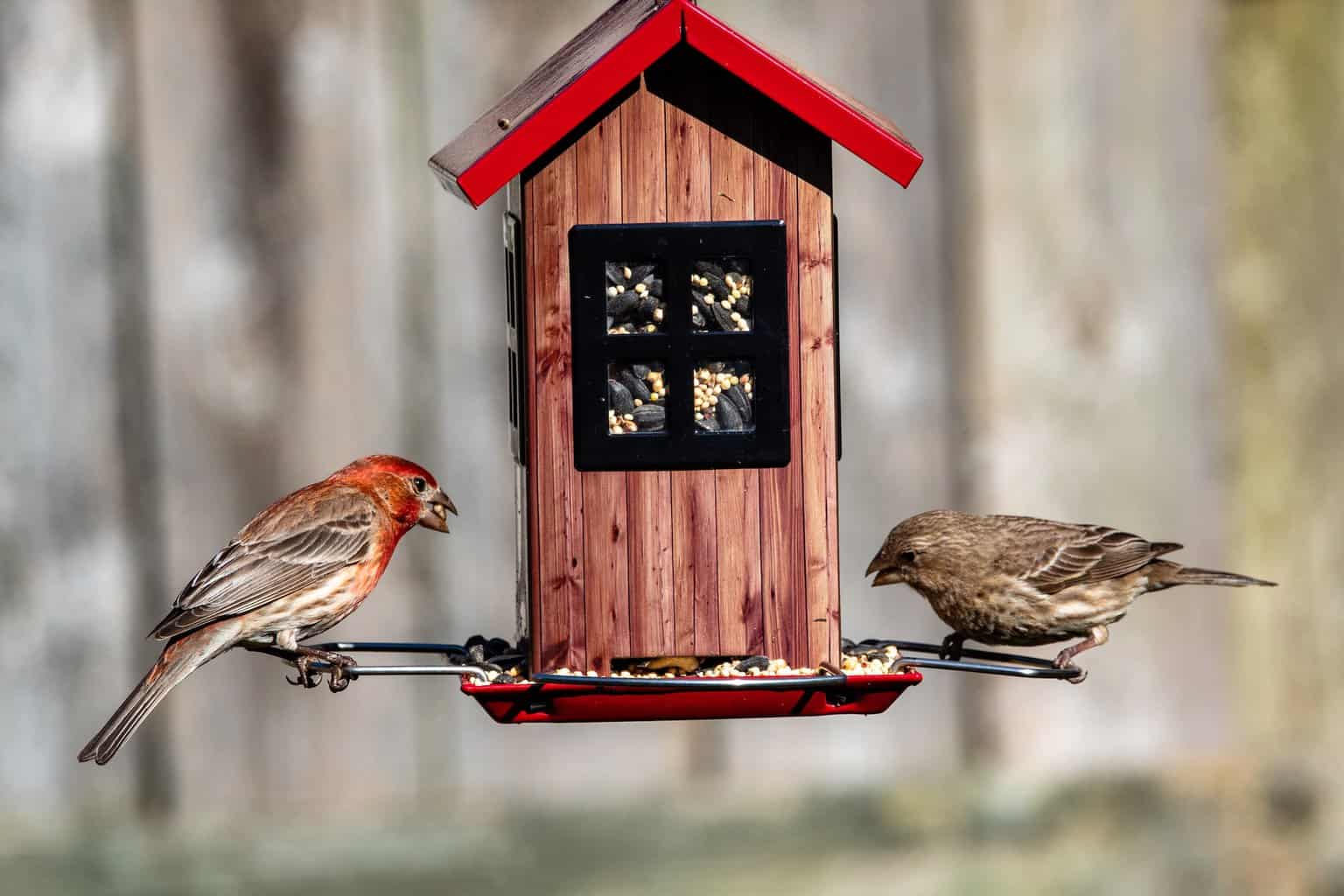
References
- Bird Seed 101: The 10 Best Types For Wild Birds
- Spending at least 120 minutes a week in nature is associated with good health and wellbeing
- Feeding Birds: A Quick Guide To Seed Types
- The 6 best wild bird seeds and food of 2021
- The Best Bird Seed on Amazon, According to Hyperenthusiastic Reviewers
- How to Choose the Best Birdseed
- Wild Bird Seed For Your Bird Feeders
- Best Bird Seed
- The Best Bird Seed for Wild Birds: Which Seed Will Attract Birds?
- 10 Best Bird Seed Brands: No Waste, No Mess Picks
- Best Types of Bird Seed That Attract the Most Birds
- Sunflower seed preference among wild birds: Gray-striped or black oil?
Looking for more interesting readings? Check out:


